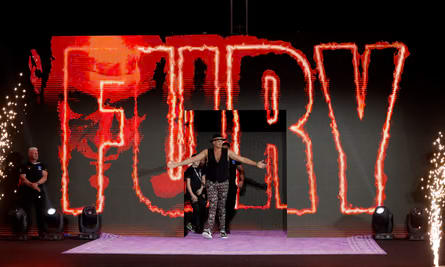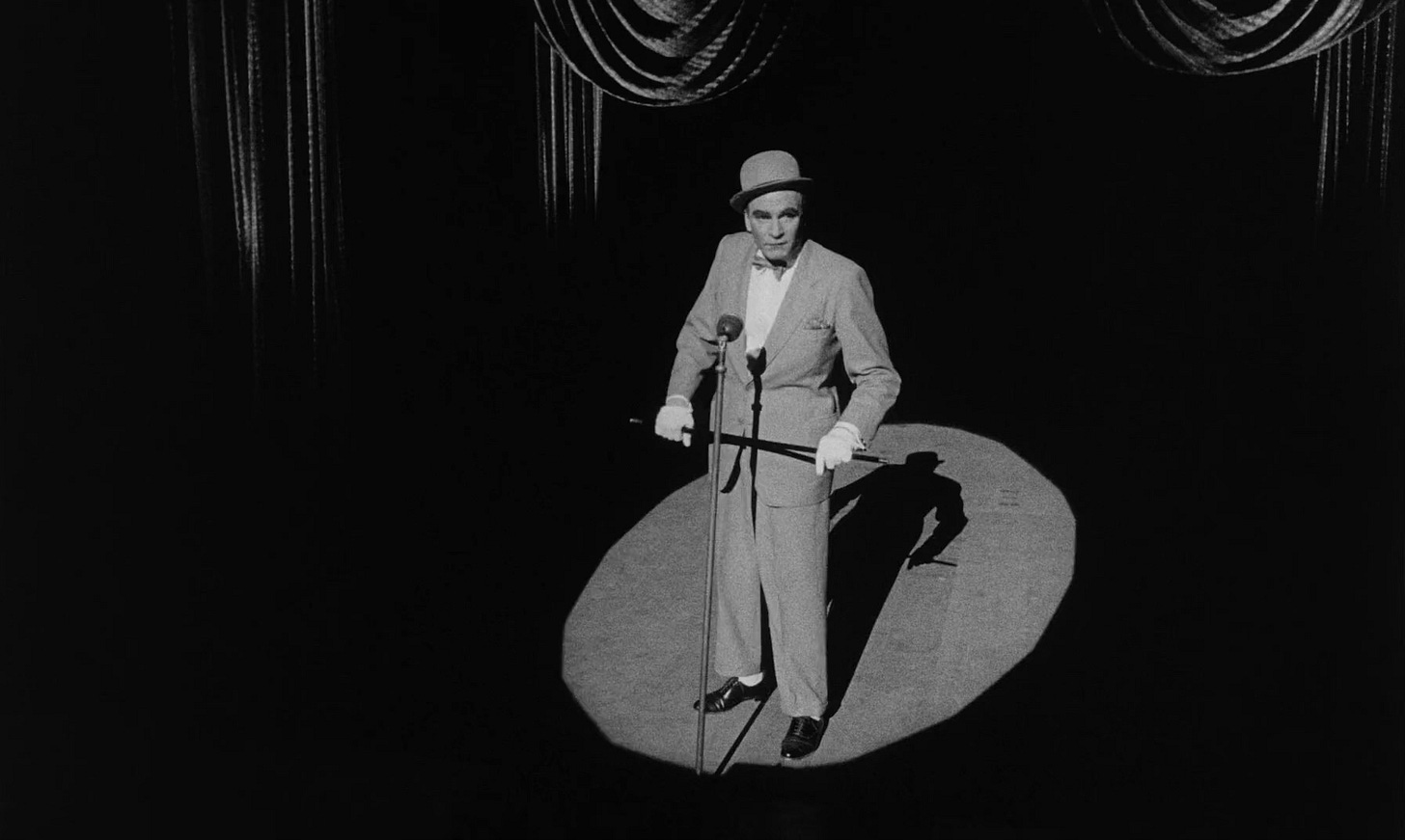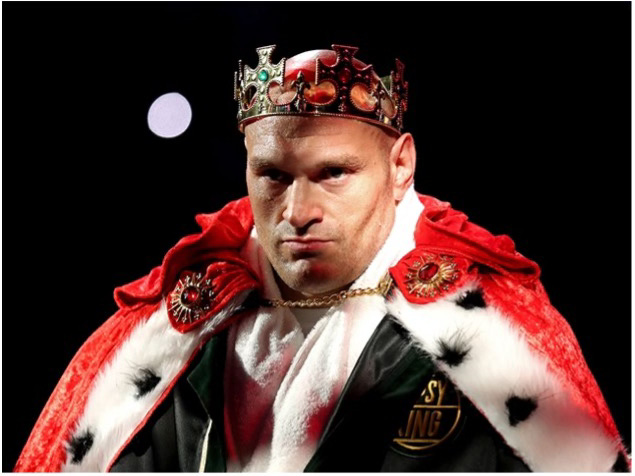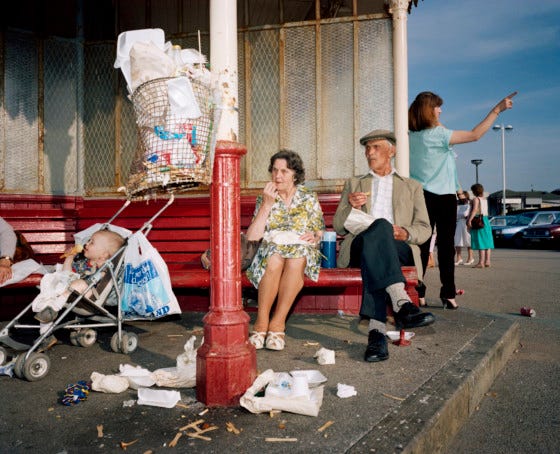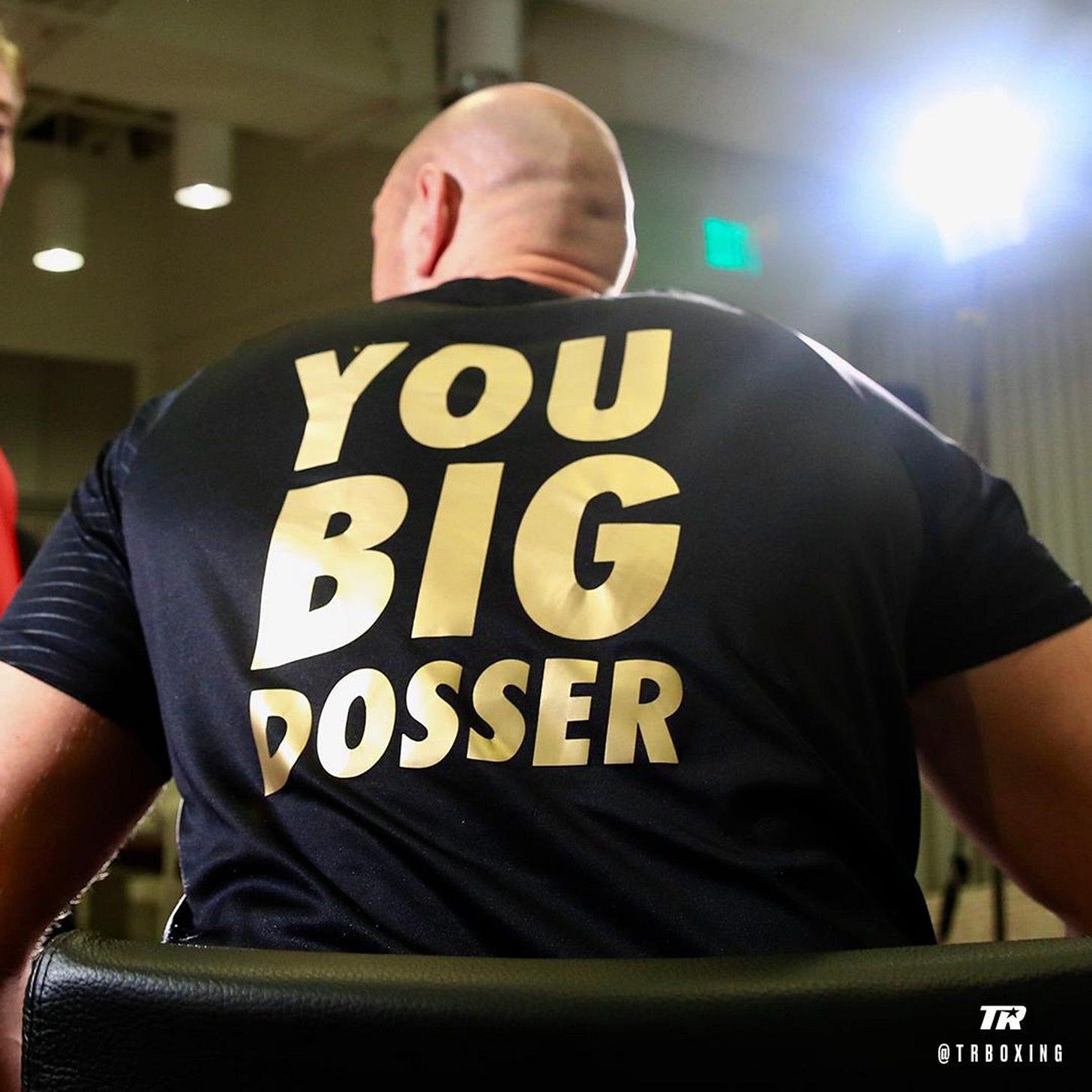The former heavyweight champion of the world and I used to go out running together. He didn’t know it, but we did. For a few months, our route was the same one, along the canal, by the sea, in Morecambe Bay. At 6’9” Tyson Fury is hard to miss, but aside from the absurd visual spectacle of our difference in height (my 5’2” gaze hitting approximately his waistband), there was nothing much unusual about spotting him on my runs. He’s a regular feature in and around Morecambe, where both he and my parents live, and where he once carried a full-sized cross down the promenade in a re-enactment of the crucifixion of Jesus Christ.
I’m back in Morecambe for Christmas, now, and I just so happened to get back on the same day that Fury would fight Oleksandr Usyk in Riyadh, an inevitably hyped rematch, after Usyk robbed him of his titles earlier this year. I’ve spent the final days of this year thinking about Tyson Fury, who claims to have been MADE IN MORECAMBE. I’ve been thinking about the grand magical theatricality of that making, and about boxing itself, which is perhaps the most genuinely guilty pleasure I have.
When I talk about boxing as a guilty pleasure, by the way, I’m not intending to put it in the same bracket as eating plain pasta with cheese, or listening to the music of ABBA. I’m meaning to invoke something with just a little more substance; an actually meaningful clash of shame and thrill. I’m meaning to acknowledge that boxing troubles me partly because I’m not entirely socially comfortable with the idea of two hyper masculine millionaires making more millions via spectacular public violence. (Perhaps more because it doesn’t quite fit with the kind of politics I’d like to devoutly display to others, rather than to do with much genuine ideological critique). Partly also, more meaningfully, because the economic and social contexts that make top-bill boxing possible now, a heady intermingling of Saudi Arabian politics and betting conglomerates, leave it quite indefensibly morally bankrupt. What follows obviously isn’t an attempt to mount a defence of that industry, nor to defend my own participation in it as a regular viewer. I don’t, however, think critical thought is tantamount to total veneration. I do think Tyson Fury demands much more critical thought than he’s generally been treated to.
Perhaps it really is just something primal, but as is probably obvious, I have a tendency to try and intellectualise the things I love. Doing so, one of the things that I think interests me most about boxing is its fundamentally contradictory state; the coming together of flesh and artifice, or, in the most reductive terms, ‘reality’ and ‘performance’. The academic Kath Woodward writes that boxing’s “enfleshed practices are inextricable from its cultural representations, its myths.” Leaving aside the wonder of the phrase “enfleshed practices,” it’s obvious that boxing and mythologised showmanship go hand in hand historically. But I think there’s a particular theatre to Tyson, one that we might think of in relation to the British seaside, a love-to-hate / in-yer-face-ness that bask in its own apparent lowliness, denies all pretension, is taught to think of itself as a form of day-release, or at least pretend to. I wonder, in other words, if Morecambe, a place I love very much, might be a prism through which to understand the man himself.
On Saturday night, Oleksandr Usyk won again, leaving no doubt as to the outcome of their previously rumbling on rivalry. I had tuned in expecting some of the theatrics that had defined their last meeting, for which Fury had been much criticised, but which I’d admittedly lapped up. This time, he entered the ring dressed as Father Christmas, and I was poised for more, but this was where the theatrics ended. What followed was a straight, and to the casual viewer, seemingly quite even-handed, fight. Then, when it was over, everything suddenly seemed a little sad. Fury was nowhere to be seen, and talk turned to who Usyk would fight next. The former was quickly forgotten - if he had gone into the ring with two possible objectives, to win and to entertain, he had seemingly failed at both. He was, the commentators seemingly endlessly noted, overly-fleshy, and getting long in the game. Inflated and belated, off he had traipsed in the pretence of disinterested defeat.
“Why should I care? Why should I let it touch me!”
John Osborne’s The Entertainer premiered in 1957, just after the Suez crisis. It’s a great play about empire and nostalgia, in which end of pier entertainers star as metaphors for the state of the nation. Its pitiable leading man, Archie Rice, was played in the 1960 film by Lawrence Olivier. The film was shot in Morecambe itself, at the once grand Alhambra Theatre. For Osborne, “a real pro is a real man, all he needs is an old backcloth behind him and he can hold them on his own for half an hour.” In that combination of professional spectacle and maculinity, I can’t but see Tyson Fury, a great fighter who once turned up to a press conference dressed as Batman. He did so, as on Saturday night, to little amusement and harsh criticisms. I think there’s something of the failed showman in the way we’re encouraged to view a man like him, make them laugh / make them cry, until they get bored, or the world moves on.
The Entertainer’s world is not far from the one Angela Carter describes in one of my favourite novels, Wise Children, in which a vaudeville performer named Gorgeous George sings about the Rose of England, and has an imperial map inked into his skin - Britain is hidden behind his peachy thong.Wise Children and The Entertainer are both concerned with geopolitics, but also, more immediately, with the spectacle of the failed entertainer. As all the connotations with collapsing empire suggest, he is explicitly racially coded - probably a little bit racist, and always, decisively, white. That coding takes on an added significance and something of an irony when it comes to Fury, both the exemplar white working-class male, and a man continually, queasily, scorned, for his own ethnic background.
Perhaps it’s because it’s Christmas, but that scorn has me thinking about another possible reading, that of the pantomime villain, the big man, behind you, so easy to boo. We love to hate the panto villain, just as people in this country have long loved to hate Tyson Fury, a man who found himself nominated for Sports Personality of the Year, and cancelled for his comments on homosexuality and abortion within the space of just a few weeks. Venerate, disdain, repeat. In 2019, Fury noted: “I was a good villain, I did a good job of being a villain.” It’s hard to say where the line gets drawn, between projection and self-reflexive performance, even professional persona.
There is no doubt that Fury is good at what he does, and that the mechanics of pantomime are a hard-earned part of that doing, but there is also no doubt that Fury’s villanous status is fuelled by ethnic judgements and grim prejudices. Attitudes towards him, no doubt not helped by his own regressive comments but also often separable from them, well reflect the vitriol directed at the traveller community throughout Britain. For Ben Myers, one of the only writers to pay Fury the kind of critical attention I think he deserves, “Fury’s is the story that many are simply embarrassed celebrate because his views don’t chime with the liberal consensus [...] Anti-traveller racism is still seen by many as an acceptable racial taboo.” Watching a Fury fight in a pub in the north-west in 2016, Myers was “struck by the shameful ethnic epithets being shouted by some of the young white men watching the fight.” This is markedly unsurprising, given those taboos are as alive and kicking as ever before, not least within white working-class communities, much as those aiming for heroic tales of solidarity might like to conveniently ignore it. As its audiences boo in unison, the pantomime villain is a reminder that nothing brings people together like a common enemy. Much as it might frustrate those of us looking for conveniently cool histories, solidarity doesn’t always come easy to those that feel themselves to be marginalised. In my experience, the politics of respectability lend a flimsy backbone to those that long for someone worse, down the street or down the ladder. Look! We’re not like them! With great regularity I’ve heard anti-traveller sentiments structure themselves so. It makes little difference if those comfortably above still seem to be shouting, smirking, back: oh yes / you are.
“I'm not one of these extremist saps / For I'm sure you'll agree / That a fellow like me / Is the salt of our dear old country…”
Oliver Brown wrote in The Telegraph this week that Fury’s loss was “classless,” but of course it was bound up too with class and race (on both sides of the fight) and with both a desire to model one’s brand through particular, classed images, and an inability or disinterest in moderating those images to satisfy an audience often hungry for narratives of cap doffing humility or exceptional escape. Other stories might get a look in too, often those of disaster or frivolous self-destruction, but the individuals in those cases can only hog the spotlight for so long, lest our gazing at their struggles come to seem dreadfully uncouth. Perhaps the problem is that Fury has taken up too much space for too long, and now must be ushered off, kept backstage, and guided out of a quiet stage door, into the abyss.
All of this talk of metaphors takes me back to what exactly it is that I don’t like about the majority of readings of the British seaside and the cultures it contains. I’m naturally suspicious of the idea of seaside as a place of mystical liminality, and I’m even less a fan of the idea, churned out over and over and over again, that it provides a Bakhtin-carnivalesque, a temporary upturning of the structure beyond it, that ultimately serves to reinforce that which it purports to smash up. BLACKPOOL STANDS BETWEEN US AND REVOLUTION, a progressive Victorian town planner is reported to once have said. I hate this idea partly because I think it is a very very very boring one, partly because I think it is an easy way to dismiss working-class culture as counter-revolutionary, a dismissal which always seems to come from the kinds of people who would rather die than spend an afternoon at Pleasure Beach. It’s all a bit O’Dreamland for me. I also dislike the idea because I think it neglects to consider the fact that lots of people live in seaside communities all year round, that these places exist beyond wakes weeks and hen weekends. They do not exist, contrary to early 20th century marketing campaigns, or the photography of Martin Parr, just for your pleasure. It’s become quite trendy to ironise re-subsume the most kitsch-y aspects of apparently tacky seaside cultures into a liberal mainstream aesthetic, but with every such instance, I think something gets lost, too.
“Setting: This is a part of the town the holiday makers never see – or, if they do, they decide to turn back to the pleasure gardens.”
If we try to push back against half-hearted metaphors, there’s that other question: how to figure these projections and constructions with the role Fury has carved out for himself? This is, after all, the self-styled “Gypsy King,” printing t-shirts with YOU BIG DOSSER shouted out in bold. Those t-shirts might seem, in the eyes of many, not only “iconic” but surely a touch ironic too, but the point remains that Fury is the one printing, and profiting, from them. The line emerged from an insult thrown at Deontay Wilder, but there’s an undoubted fuck-you in the image of the often overweight, white working-class Mancunian, with the words of those that would weaponise the welfare state against him, emblazoned in shiny big gold. Fury is, I think, more than capable of this kind of self-reflexivity, embracing that which is so often thrown in his face. He knows, notes, and uses, his status as flop entertainer and festive villain, both wrapped up as they are in the dying arts of the alleged white working-class, and uses these supposed failures to his own international gain. These types remain cruel, two-dimensional puppets, but just who is pulling the strings isn’t always clear. It’s a difficult balancing act to manage, a difficult two-hander to perform.
I’m not sure there’s any way to square all that, though I’ll be thinking through it, as I skip and swig my way through the rest of the festive period in our shared seaside town. What befalls the pier performer and the pantomime villain for the rest of the year? What happens to these cultures when they’re not being briefly treated to curious examination? In the final lines of The Entertainer, “the little world of light snaps out, the stage is bare and dark. Archie Rice has gone.” I don’t know if we’ll all be forced to pretend that the same fate has befallen Fury, though if so, I hope I’ll see him out running one day again afterwards, big and real and plodding on. When I do, it’ll be a reminder that the whole point of constructions such as those that have shaped his image is their paradoxically permanent ephemerality, they surely cannot possibly last. Yet these bodies remain, somewhere, like it or not. Enfleshed practices remain enfleshed, no matter how mystical they might first seem.
The citing of the seaside or the pantomime or the grafting entertainer or the traveller boxer comes to fall flat when used only as a weak metaphor for other, grander, subjects. In another of my favourite takes on the British seaside, Ann Quin’s Berg, the main character imagines his backstreet off-season surrounds as a theatrical set, flat, and easily collapsed and transported. Yet for me, the whole joy of that book is how it sucks us into Berg’s entitled, self-revolving rambles. As he heads into a ghost train tunnel at the novel’s close, I always laugh just a little, at this silly existentialist imagining the world revolves around him, a Hamlet-wannabe, actually being sent in circles by a ghost train operator. That operator is probably going home to one of those seeming theatrical sets, arriving back and making himself some dinner after a long shift. For him, they are probably not quite so poetically flat.
Should these people, these things, these places, never be treated on their own terms? To be reminded of that question (and the labour of actually enacting it) can sting, and pull apart precocious analyses like this one, but I think it’s a necessary reminder, that such people and things and places exist beyond our easy viewing pleasure. They’re as real, sharp, and actually quite complicated, like Tyson, as a left hook to the face.




